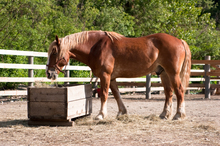During hard economic times, finding enough feed for a horse may be difficult for some horse owners. The temptation may be there to let a horse eat feed that is not meant for horses such as cattle feed or feed or grain intended for poultry or other animals.

Horse feed for horses - Cattle feed for cattle
FDA guidelines are established to protect owners from feeding their horses feeds that would be dangerous including cattle feed containing ionophores that are deadly for horses.
According to information provided by the faculty of the Oklahoma State University Boren Veterinary Medical Teaching Hospital, many people would probably argue that they have fed cattle feed to their horses for years and never had a problem. They are likely telling the truth but this still does not make it appropriate.
If you are a person that carefully analyzes feed tags you will note that there are very few differences between many cattle feeds and horse feeds. From a purely nutrient quantity stand point, the feeds may be very similar. However, it is important to take into careful consideration the manufacturing or milling process when comparing horse feeds to cattle feeds.
There are guidelines established by the Food and Drug Administration for safe feed manufacturing processes. These guidelines are established to protect animal owners from feeding a feed that would be dangerous for their animal whether it be a horse feed containing a cattle feed component like monensin or a sheep feed containing too much copper.
These guidelines, however, do not protect those horse owners that choose to feed their horses cattle feed or sheep owners that choose to feed their sheep horse feed. Some cattle feeds contain a medication called an ionophore (i.e. monensin or rumensin). Ionophores are deadly to horses in very low levels, thus feeding cattle feed that contains an ionophore to a horse could be a devastating mistake.
Easy, you say, I will just avoid feeding a medicated cattle feed. This is where knowing the milling process becomes important.
Feed mills that manufacture cattle feeds and horse feeds in the same mill must take the mill through a cleansing process after they have milled medicated cattle feed before they can mill horse feed.
Some mills will run non-medicated cattle feed through the mill after a medicated feed and prior to a horse feed to ensure there is no contamination of the horse feed. This “non-medicated” feed could, therefore, contain very small amounts of the medicated feed which would be negligent to a bovine but could cause serious problems in a horse.
Many mills that produce horse feeds have gone to producing their horse feed at a completely different site just to avoid any chance of contamination of their horse feed with a medicated cattle feed.
When you decide to feed your horse cattle feed, you forfeit the protection offered to you when feeding feeds that are strictly labeled for use in horses. Knowing how deadly the consequences can be, it is recommended that horses be fed feeds that are manufactured for horses and leave the cattle feed for cattle.
